29 dec 2014
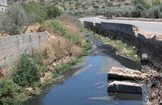
Hebron school employees ill after opening suspicious package
Israeli bulldozers, Sunday, razed agricultural lands belonging to Palestinians in Khirbet al-Taweel, located to the south of Nablus. Two Hebron district schools were also reported to have been targeted with unnecessary violence.
Member of the anti-settlement committee in Aqraba, Yousif Dirieh, told WAFA Palestinian News & Info Agency that Israeli bulldozers razed several dunams of land planted with wheat crops in the locale, destroying the harvest.
Soldiers also set up earth mounds in the area, as a prelude for military training exercises.
Israeli forces follow a systematic policy of targeting agricultural land that is considered to be the main livelihood of Palestinians, as an attempt to force residents to leave their land, for the benefit of settlement expansion.
The occupied West Bank is also a scene of frequent settler attacks against Palestinians and their property, including physical assaults on farmers, in addition to crop theft and/or destruction, which is often done under the protection of Israeli soldiers.
WAFA notes that settler attacks against Palestinian farmers increase significantly during the olive harvest season.
Farmers often complain of sewage water pumped from nearby settlements into their land, thus destroying their crops.
The PNN reports that eyewitnesses and Palestinian shepherds, Sunday, complained about factories in the industrial zone of "Burkhan" Israeli settlement, near Salfit, in the northern West Bank, as settlers routinely dump their waste-water into the region's valleys over the weekend.
Researcher Khaled Ma'ali said that the waste-water from Borkan factory is not poured gradually but, rather, all at once.
The four industrial zones pouring the "skunk water" into the Salfit valleys are located in Ariel, Borkan, Amanoel and Zahav illegal settlements, according to eyewitnesses.
Ma'ali assured that the environmental pollution caused by the settlements' industrial zones takes long years to recover, and will cause extensive environmental destruction.
He is calling on environment organizations to hold Israeli authorities accountable for the damage it is causing, and to compensate those affected.
Related: Israeli Police Adopt New Crowd Control Method in Jerusalem
Furthermore, on Sunday, Israeli soldiers violently raided a boys’ school in the town of al-Khader, to the south of Bethlehem, in search of two students.
Witnesses told WAFA that a number of soldiers raided the school yard and the principal’s office in a brutal manner, in search of the two students, spreading panic and fear among other students.
The teaching staff prevented the soldiers from coming near the students, however, and forced them out of the school.
Israeli forces often target schools and other educational facilities and tends to use excessive force against students and teaching staff, in further violation of international law.
“Fifty-eight education-related incidents affecting 11,935 children were reported in the West Bank in 2013, resulting in damage to school facilities, interruption of classes and injury to children,” according to the United Nations Special Representative for Children and Armed Conflict.
The organization reported that “forty-one incidents involved Israeli security forces operations near or inside schools, forced entry without forewarning, the firing of tear gas canisters and sound bombs into school yards and, in some cases, structural damage to schools.”
In related news, the principal of al-Hussein Ibn Ali school, in Hebron, as well as the school secretary and janitor have fallen ill after receiving a suspicious package on Sunday, a local official said.
Director of the Hebron branch of the Palestinian Ministry of Education Bassam Tahboub told Ma'an News Agency that the three employees began suffering from nausea and dizziness immediately after opening an envelope that had arrived from Italy.
"When the school principal, Abd al-Muati Abu Sneina, opened it in the presence of secretary Fadi Shehada and janitor Nidal al-Qawasmi, they all started to sneeze in an unusual way and they had nausea and dizziness before they were evacuated to the public hospital of Hebron," he said.
Director of the area's public hospital, Abdullah al-Qawasmi, said that the three would remain in the hospital for follow up, though he confirmed that the three are in stable condition.
They are suffering from agitation and continuous sneezing caused by a "gluey material wrapped in cellophane inside the envelope," he further stated.
The material has been sent to governmental laboratories to be tested, while Palestinian security services have launched an investigation into the incident.
The case is the third of its kind in Hebron in recent weeks.
See also: 12/10/14 Mayor of Hebron Sent Toxic Substance and Death Threats
Israeli bulldozers, Sunday, razed agricultural lands belonging to Palestinians in Khirbet al-Taweel, located to the south of Nablus. Two Hebron district schools were also reported to have been targeted with unnecessary violence.
Member of the anti-settlement committee in Aqraba, Yousif Dirieh, told WAFA Palestinian News & Info Agency that Israeli bulldozers razed several dunams of land planted with wheat crops in the locale, destroying the harvest.
Soldiers also set up earth mounds in the area, as a prelude for military training exercises.
Israeli forces follow a systematic policy of targeting agricultural land that is considered to be the main livelihood of Palestinians, as an attempt to force residents to leave their land, for the benefit of settlement expansion.
The occupied West Bank is also a scene of frequent settler attacks against Palestinians and their property, including physical assaults on farmers, in addition to crop theft and/or destruction, which is often done under the protection of Israeli soldiers.
WAFA notes that settler attacks against Palestinian farmers increase significantly during the olive harvest season.
Farmers often complain of sewage water pumped from nearby settlements into their land, thus destroying their crops.
The PNN reports that eyewitnesses and Palestinian shepherds, Sunday, complained about factories in the industrial zone of "Burkhan" Israeli settlement, near Salfit, in the northern West Bank, as settlers routinely dump their waste-water into the region's valleys over the weekend.
Researcher Khaled Ma'ali said that the waste-water from Borkan factory is not poured gradually but, rather, all at once.
The four industrial zones pouring the "skunk water" into the Salfit valleys are located in Ariel, Borkan, Amanoel and Zahav illegal settlements, according to eyewitnesses.
Ma'ali assured that the environmental pollution caused by the settlements' industrial zones takes long years to recover, and will cause extensive environmental destruction.
He is calling on environment organizations to hold Israeli authorities accountable for the damage it is causing, and to compensate those affected.
Related: Israeli Police Adopt New Crowd Control Method in Jerusalem
Furthermore, on Sunday, Israeli soldiers violently raided a boys’ school in the town of al-Khader, to the south of Bethlehem, in search of two students.
Witnesses told WAFA that a number of soldiers raided the school yard and the principal’s office in a brutal manner, in search of the two students, spreading panic and fear among other students.
The teaching staff prevented the soldiers from coming near the students, however, and forced them out of the school.
Israeli forces often target schools and other educational facilities and tends to use excessive force against students and teaching staff, in further violation of international law.
“Fifty-eight education-related incidents affecting 11,935 children were reported in the West Bank in 2013, resulting in damage to school facilities, interruption of classes and injury to children,” according to the United Nations Special Representative for Children and Armed Conflict.
The organization reported that “forty-one incidents involved Israeli security forces operations near or inside schools, forced entry without forewarning, the firing of tear gas canisters and sound bombs into school yards and, in some cases, structural damage to schools.”
In related news, the principal of al-Hussein Ibn Ali school, in Hebron, as well as the school secretary and janitor have fallen ill after receiving a suspicious package on Sunday, a local official said.
Director of the Hebron branch of the Palestinian Ministry of Education Bassam Tahboub told Ma'an News Agency that the three employees began suffering from nausea and dizziness immediately after opening an envelope that had arrived from Italy.
"When the school principal, Abd al-Muati Abu Sneina, opened it in the presence of secretary Fadi Shehada and janitor Nidal al-Qawasmi, they all started to sneeze in an unusual way and they had nausea and dizziness before they were evacuated to the public hospital of Hebron," he said.
Director of the area's public hospital, Abdullah al-Qawasmi, said that the three would remain in the hospital for follow up, though he confirmed that the three are in stable condition.
They are suffering from agitation and continuous sneezing caused by a "gluey material wrapped in cellophane inside the envelope," he further stated.
The material has been sent to governmental laboratories to be tested, while Palestinian security services have launched an investigation into the incident.
The case is the third of its kind in Hebron in recent weeks.
See also: 12/10/14 Mayor of Hebron Sent Toxic Substance and Death Threats
26 dec 2014
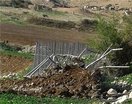
Israeli forces demolished six EU-funded irrigation pools used by Palestinian farmers in the northern Jordan Valley, on Thursday, locals told Ma'an News Agency.
Israeli military vehicles accompanied by bulldozers arrived in al-Jiftlik, where they demolished the pools used by Palestinian farmers, under pretext of "military order".
The construction of the pools was reportedly funded by grants from European donor countries.
The Jordan Valley makes up around 30 percent of the occupied West Bank, with over 90 percent of the area designated as Area C and off-limits to Palestinian construction.
Israeli military vehicles accompanied by bulldozers arrived in al-Jiftlik, where they demolished the pools used by Palestinian farmers, under pretext of "military order".
The construction of the pools was reportedly funded by grants from European donor countries.
The Jordan Valley makes up around 30 percent of the occupied West Bank, with over 90 percent of the area designated as Area C and off-limits to Palestinian construction.
19 dec 2014
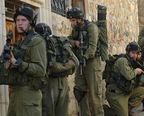
A number of Israeli military vehicles invaded, on Friday, an area in the al-Khader town, south of the West Bank city of Bethlehem, and ordered a Palestinian to stop digging a water well in his land, close to an illegal settlement.
Ahmad Salah, coordinator of the Popular Committee against the Wall and Settlements in al-Khader, told the Palestinian News and Info Agency (WAFA) that the soldiers, accompanied by personnel of the “Civil Administration Office," invaded the Thahr al-Jorn area, close to Neve Daniel illegal settlement, and handed the order to Khader Ali Ghneim.
The army told Ghneim that the well he was digging “did not receive a permit from the Civil Administration Office,” run by the military in the occupied West Bank.
The well is part of a project run by the Palestinian Agricultural Relief aiming at helping the Palestinians, especially amidst the ongoing Israeli violations against them, and their lands, for the benefit of illegal settlements.
In related news, soldiers confiscated three Palestinian tractors, east of Yatta town in the southern West Bank district of Hebron, and prevented the Palestinians from plowing their lands to prepare for the winter season.
Rateb Jabour, coordinator of the Popular Committee against the Wall and Settlements, said the soldiers confiscated the tractors in Susiya area, and that the machines belong to members of the Nawaj’a family.
He called on local and international human rights groups and organizations to act on ending the ongoing Israeli violations against the Palestinians, and their lands.
Ahmad Salah, coordinator of the Popular Committee against the Wall and Settlements in al-Khader, told the Palestinian News and Info Agency (WAFA) that the soldiers, accompanied by personnel of the “Civil Administration Office," invaded the Thahr al-Jorn area, close to Neve Daniel illegal settlement, and handed the order to Khader Ali Ghneim.
The army told Ghneim that the well he was digging “did not receive a permit from the Civil Administration Office,” run by the military in the occupied West Bank.
The well is part of a project run by the Palestinian Agricultural Relief aiming at helping the Palestinians, especially amidst the ongoing Israeli violations against them, and their lands, for the benefit of illegal settlements.
In related news, soldiers confiscated three Palestinian tractors, east of Yatta town in the southern West Bank district of Hebron, and prevented the Palestinians from plowing their lands to prepare for the winter season.
Rateb Jabour, coordinator of the Popular Committee against the Wall and Settlements, said the soldiers confiscated the tractors in Susiya area, and that the machines belong to members of the Nawaj’a family.
He called on local and international human rights groups and organizations to act on ending the ongoing Israeli violations against the Palestinians, and their lands.
2 dec 2014
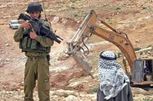
Several Israeli military vehicles invaded, Tuesday, Masafer Yatta and the al-Mafqara Bedouin communities, south of the southern West Bank city of Hebron, and handed destruction orders against residential tents, and structures.
Coordinator of the Popular Committee against the Wall and Settlements in southern Hebron Rateb Jabour said the soldiers handed orders against a residential tent in Masafer Yatta, and three tents in al-Mafqara, near the Tiwani area.
Soldiers also photographed an elementary school in the area, an issue that raised fears among the residents that the army intends to demolish it.
Last month, the army demolished and removed a number of residential structures, sheds and barns in the area, and handed orders against several tents, barns and water wells in a number of communities near Yatta.
Coordinator of the Popular Committee against the Wall and Settlements in southern Hebron Rateb Jabour said the soldiers handed orders against a residential tent in Masafer Yatta, and three tents in al-Mafqara, near the Tiwani area.
Soldiers also photographed an elementary school in the area, an issue that raised fears among the residents that the army intends to demolish it.
Last month, the army demolished and removed a number of residential structures, sheds and barns in the area, and handed orders against several tents, barns and water wells in a number of communities near Yatta.
20 nov 2014

A number of extremist Israeli settlers invaded, Thursday, the village of Qusra, south of the northern West Bank city of Nablus, and attacked property before local villagers chased them, and briefly detained two.
Ghassan Daghlas, a Palestinian official in charge of Israeli Settlements file in northern West Bank, said the settlers came from Yesh Kodesh illegal settlement, south of the village.
Daghlas added that local youths surrounded the invading settlers, and held two of them for more than 30 minutes, before the Palestinian District Coordination office intervened, and handed them to the Israeli side.
The official further stated that clashes took place in the village after several Israeli military vehicles invaded it, and handed the residents military orders to demolish six water wells.
Ghassan Daghlas, a Palestinian official in charge of Israeli Settlements file in northern West Bank, said the settlers came from Yesh Kodesh illegal settlement, south of the village.
Daghlas added that local youths surrounded the invading settlers, and held two of them for more than 30 minutes, before the Palestinian District Coordination office intervened, and handed them to the Israeli side.
The official further stated that clashes took place in the village after several Israeli military vehicles invaded it, and handed the residents military orders to demolish six water wells.
17 nov 2014

Iyad Salman was terribly shocked to find out that his 9-year-old son, Mohammad, has osteoporosis, an illness that became hugely spread between the children of Gaza.
Iyad assured that he was always keen that his children have a healthy lifestyle.
However, his son became ill after buying and drinking desalinated water from carts that sell it in Tal-Sultan neighborhood in Rafah where he lives.
Mohammed's doctor immediately diagnosed the causative of the illness to be the sold desalinated water, which was reiterated by the head of water monitoring department in the Ministry of Health, saying that the lack of chloride in the water causes osteoporosis, especially for children.
Despite knowing the causes for the illness, there is no substitute for the desalinated water, since the water provided by the Municipality is salted and unfit for drinking, and Israeli occupation control over more than 82% of Palestinian water.
Iyad assured that he was always keen that his children have a healthy lifestyle.
However, his son became ill after buying and drinking desalinated water from carts that sell it in Tal-Sultan neighborhood in Rafah where he lives.
Mohammed's doctor immediately diagnosed the causative of the illness to be the sold desalinated water, which was reiterated by the head of water monitoring department in the Ministry of Health, saying that the lack of chloride in the water causes osteoporosis, especially for children.
Despite knowing the causes for the illness, there is no substitute for the desalinated water, since the water provided by the Municipality is salted and unfit for drinking, and Israeli occupation control over more than 82% of Palestinian water.
16 oct 2014

Dozens of Israeli settlers damaged Palestinian-owned water wells in the Khirbet Samra area of the Jordan Valley, a local official said on Wednesday.
Aref Daraghma, head of a local village council, told Ma'an News Agency that dozens of Israeli settlers who gathered to celebrate the Jewish holiday of Sukkot damaged more than seven wells in the al-Malah area of Khirbet Samra.
The covers of the wells were damaged, and parts of some of the wells were "destroyed," he said, asserting that the settlers' actions were meant to pressure Palestinian residents to leave the area.
The Jordan Valley is within the 61 percent of the occupied West Bank under full Israeli military control known as "Area C", Ma'an reports. The area comprises the only contiguous piece of land connecting 227 Palestinian residential communities in areas A and B, as well as about 150,000 Palestinian residents.
Every year there are dozens of attacks by Israeli settlers on Palestinians and their property in the occupied West Bank, but these crimes are rarely prosecuted and are often facilitated by Israeli authorities. More than 500,000 Israeli settlers now reportedly live in illegal settlements across the West Bank and East Jerusalem, in direct violation of international law.
Aref Daraghma, head of a local village council, told Ma'an News Agency that dozens of Israeli settlers who gathered to celebrate the Jewish holiday of Sukkot damaged more than seven wells in the al-Malah area of Khirbet Samra.
The covers of the wells were damaged, and parts of some of the wells were "destroyed," he said, asserting that the settlers' actions were meant to pressure Palestinian residents to leave the area.
The Jordan Valley is within the 61 percent of the occupied West Bank under full Israeli military control known as "Area C", Ma'an reports. The area comprises the only contiguous piece of land connecting 227 Palestinian residential communities in areas A and B, as well as about 150,000 Palestinian residents.
Every year there are dozens of attacks by Israeli settlers on Palestinians and their property in the occupied West Bank, but these crimes are rarely prosecuted and are often facilitated by Israeli authorities. More than 500,000 Israeli settlers now reportedly live in illegal settlements across the West Bank and East Jerusalem, in direct violation of international law.
2 oct 2014
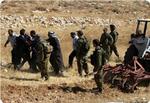
The Israeli occupation forces (IOF) on Wednesday afternoon stormed Wadi al-Maleh area in the northern Jordan Valley and apprehended five Palestinian farmers on charges of repairing a water well to irrigate their crops. Head of Wadi al-Maleh village council, Aref Daraghma, told a PIC correspondent: “A group of peaceful farmers gathered to repair a water well for urgent use in Wadi al-Maleh before the IOF troops suddenly raided the area and ordered them to stop the repair.”
“As soon as the Palestinian natives voiced their protest at the decision, given the fact that both the land and the water were properties of their own, the IOF nabbed all those who were present at the scene and seized their vehicle and equipment,” Daraghma confirmed.
Palestinian natives of the village have long been denied the right to use natural water supplies in the area as part of Israel’s tacit deportation schemes, he added.
Palestinian farmers and shepherds are forced to purchase costly water tanks at a time when the Israeli illegal settlers have been exploiting every water well and spring in the area, he further charged.
A similar IOF assault cropped up in al-Khalil on Wednesday afternoon as the IOF raided Jduan hamlet, east of Yatta, south of al-Khalil, and threatened to demolish Palestinians’ water wells, the WAFA News Agency quoted Rateb Jabour, coordinator of the popular committee against the wall and settlement in southern al-Khalil, as reporting.
“As soon as the Palestinian natives voiced their protest at the decision, given the fact that both the land and the water were properties of their own, the IOF nabbed all those who were present at the scene and seized their vehicle and equipment,” Daraghma confirmed.
Palestinian natives of the village have long been denied the right to use natural water supplies in the area as part of Israel’s tacit deportation schemes, he added.
Palestinian farmers and shepherds are forced to purchase costly water tanks at a time when the Israeli illegal settlers have been exploiting every water well and spring in the area, he further charged.
A similar IOF assault cropped up in al-Khalil on Wednesday afternoon as the IOF raided Jduan hamlet, east of Yatta, south of al-Khalil, and threatened to demolish Palestinians’ water wells, the WAFA News Agency quoted Rateb Jabour, coordinator of the popular committee against the wall and settlement in southern al-Khalil, as reporting.
|
28 aug 2014
|
7 aug 2014
|
|
|
|
6 aug 2014
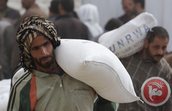
Excessive Israeli restrictions on Palestinian territories cannot be justified on the grounds they protect Israel, a British parliamentary committee said on Wednesday.
"We challenge the assertion that restrictions which curtail economic development in the Occupied Palestinian Territories are based on Israel's security needs and can be justified on security grounds," the report by the International Development Committee said.
The paper expressed particular concern about the situation in Hebron, the Palestinian city in the southern West Bank.
"We were shocked by what we saw during our visit to Hebron. While we fully appreciate Israel's security concerns, these in no way justify the present restrictions on Palestinians in Hebron, which affect their livelihoods, economic development, and security," the report said.
The group, which monitors the British government's ministry of international development, called for London and Europe to speak out against restrictions that prevent economic development "as a matter of urgency."
The call comes a day after Baroness Sayeeda Warsi resigned as a government minister in protest at what she said was a "morally indefensible" failure by the government to condemn Israel's killing of civilians in Gaza.
The lifting of an eight-year blockade of Gaza has been a key demand of all Palestinian factions.
But West Bank restrictions in particular, such as the prevention of Palestinian businesses investing in the Israeli-controlled zone, should be opposed by Britain and other European countries, the report said.
It added that issues such as greater access to water and construction permits should be addressed regardless of the current conflict, which has killed 1,875 Palestinians including 430 children, 64 Israeli soldiers and three civilians in Israel.
The committee said it was "extremely concerned" that Israel could further expand settlements, and said Britain and other European countries should "stress to the Israeli authorities the unacceptability of the present situation."
The British government should also examine whether guidelines on the labeling of produce made in Israeli settlements to allow consumers to avoid buying them has been implemented by retailers, the report said.
"We challenge the assertion that restrictions which curtail economic development in the Occupied Palestinian Territories are based on Israel's security needs and can be justified on security grounds," the report by the International Development Committee said.
The paper expressed particular concern about the situation in Hebron, the Palestinian city in the southern West Bank.
"We were shocked by what we saw during our visit to Hebron. While we fully appreciate Israel's security concerns, these in no way justify the present restrictions on Palestinians in Hebron, which affect their livelihoods, economic development, and security," the report said.
The group, which monitors the British government's ministry of international development, called for London and Europe to speak out against restrictions that prevent economic development "as a matter of urgency."
The call comes a day after Baroness Sayeeda Warsi resigned as a government minister in protest at what she said was a "morally indefensible" failure by the government to condemn Israel's killing of civilians in Gaza.
The lifting of an eight-year blockade of Gaza has been a key demand of all Palestinian factions.
But West Bank restrictions in particular, such as the prevention of Palestinian businesses investing in the Israeli-controlled zone, should be opposed by Britain and other European countries, the report said.
It added that issues such as greater access to water and construction permits should be addressed regardless of the current conflict, which has killed 1,875 Palestinians including 430 children, 64 Israeli soldiers and three civilians in Israel.
The committee said it was "extremely concerned" that Israel could further expand settlements, and said Britain and other European countries should "stress to the Israeli authorities the unacceptability of the present situation."
The British government should also examine whether guidelines on the labeling of produce made in Israeli settlements to allow consumers to avoid buying them has been implemented by retailers, the report said.
